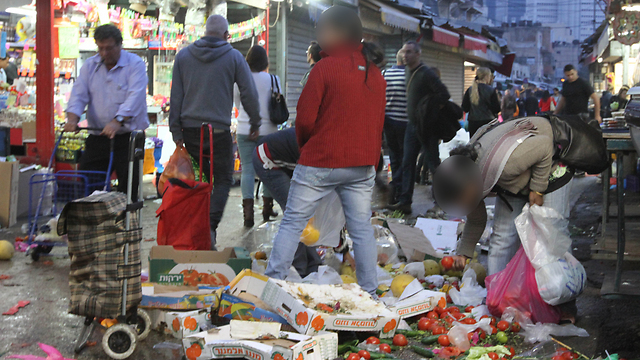
Government only allocates fraction of budget pledged to aid needy.
Photo: Ido Erez
The government had pledged to give NIS 60 million in aid to people in need, but in reality only allocated NIS 2 million in the budget for food security, Ynet learned Thursday. The Social Affairs Ministry said in response that the delay in handing over the funds was caused by "governmental procedures regarding the allocation."

In January 2014, former finance minister Yair Lapid stated that the government would pledge NIS 60 million to food aid organizations for the purchase of food baskets and food cards for people in need.

Poverty-stricken Israelis sift through discarded vegetables at Carmel market in Tel Aviv. (Photo: Ido Erez)
Lapid and former social affairs minister Meir Cohen had, however, also pledged NIS 170 million for various initiatives promoting nutritional security, which was transferred as promised.
But the NIS 60 million for Israelis in need of state support to buy food was delayed over and over again after disagreements as to how to allocate the funds emerged between the Social Affairs Ministry and Attorney General Yehuda Weinstein.
In the end, the Social Affairs Ministry announced last week that NIS 175,000 would be transferred to the National Food Bank and NIS 325,000 to the Latet organization, which fights poverty. Another NIS 1.5 million will be transferred to additional organizations for the purchase of basic food.
Because of the attorney general's stance, the Social Affairs Ministry decided that the funds for the organizations would be given as "subsidies" and as such required the correct paperwork. A list of the criteria for the subsidies was transferred to the organizations only in the last weeks of 2014 – about 10 months after the pledge was made.
Furthermore, the sum pledged to the organizations is not part of the budget and instead has been taken from the Finance Ministry's surplus – which could mean that the pledge will not become a part of the budget in the upcoming years.
This non-transfer of funds is the latest in a list of cuts to the budget to fight poverty. Some of these cuts are due to the upcoming early elections, such as the cancelation of NIS 340 million to guarantee a minimal income for some 200,000 senior citizens that was scheduled for January. Simiarly, a recommendation to add 7.8 billion shekels to the Committee for the War on Poverty was disregarded.
The issue of allocating funds for nutritional security has only compounded as a series of pledges by governmental committees were abandoned one after another starting in 2008 when current Labor Party leader Isaac Herzog held the position of social affairs minister and throughout the time Moshe Kahlon and Meir Cohen held the positions.
Commitments to allocate funds for food security were given only after the associations petitioned the High Court and a government committee was created dedicated to the matter.
According to a social security study from February 2014, 18.8% of Israeli families suffer from insecurity when it comes to food, categorized in developed countries as "inconsistent access to food in a sufficient amount enabling a healthy and active lifestyle."
Another 243,000 families suffer from severe lack of food, making up 8% of the population.
"In recent months we published several depressing reports regarding the poverty level and the nutritional insecurity in Israel. The Alalouf report, the Taub Center report, the Social Security Poverty Report and more. It is unclear to me, if so, how such a small amount of NIS 175 thousand is supposed to help 'Leket Israel' take care of the issue of hunger that is blaring," said CEO of the National Food Bank Leket Israel Gidi Kroch.
Kroch added that "the gaps between the promises to reality are hard to bridge together, not for Leket Israel, but for those people who cannot afford (food) and need help which the government is preventing them from getting. In light of this, we prefer that the amount that was allocated to us be transferred to smaller organizations, for the benefit of the needy, and we at Leket Israel will continue to work and worry for them through the donations we receive as we have done until today."
Attorney Eran Weintraub the CEO of the Latet organization said: "It is sad that after eight years of promises and pledges by the government to take care of the matter of nutritional insecurity, a budget was allocated that would be enough for monthly support of 139 families, while hundreds of thousands of families are enduring horrible poverty."
Weintraub added that the amount was "comparable to a donation by a philanthropic fund and not from the position of the state and reflect inadequate priorities and governmental failure in handling the matter for many years. On the one hand, we appreciate all the support and need every resource in order to address the many families that live in terrible distress. On the other hand, in view of the bottom line, which means removing the responsibility for handling the situation, we will consider whether to cooperate with this process."
A resident of Dimona, a mother of two who is in advanced pregnancy, described her difficult financial situation. "I live with my two children in an Amidar (state-owned) apartment. I've been thrown into a difficult situation, I'm not working currently and I don't have any help," she said. "Welfare supports me emotionally but there is no budget. My entire life is in boxes."
The Social Welfare Committee said in a response: "Following the prolonged proceedings regarding the allocation of government funds, distribution criteria were only formulated in the last quarter of 2014 and we could only distribute a fraction of the amount which we committed to. It should be remembered that the state and the Ministry of Social Affairs sent tens of millions in favor of food security in 2014 – funds that were distributed in addition to the budgets that existed until this year.
Sources within the Social Affairs Ministry added: "In 2015 we will make a new analysis of these budgets. We would like the state to directly take care of the matter of nutritional security and not transfer the funds to organizations with high overheads (maintenance costs).















